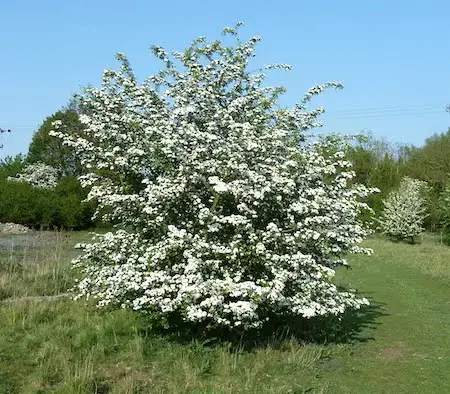Let’s look first at the ‘cast a clout’ part. The word ‘clout’, although archaic, is straightforward. Since at least the early 15th century ‘clout’ has been used variously to mean ‘a blow to the head’, ‘a clod of earth or (clotted) cream’ or ‘a fragment of cloth, or clothing’. It is the last of these that is meant in ‘cast a clout’. This was spelled variously spelled as clowt, clowte, cloot, clute. Here’s an early example, from the Early English Miscellanies in Prose and Verse, circa 1485:
“He had not left an holle clowt, Wherwith to hyde hys body abowte.”
So, ‘ne’er cast a clout…’ simply means ‘never discard your [warm winter] clothing…’.
The ’till May be out’ part is where the doubt lies. On the face of it this means ‘until the month of May is ended’.
There is another interpretation. In England, in May, you can’t miss the Hawthorn. It is an extremely common tree in the English countryside, especially in hedges. Hawthorns are virtually synonymous with hedges. As many as 200,000 miles of hawthorn hedge were planted in the Parliamentary Enclosure period, between 1750 and 1850. The name ‘Haw’ derives from ‘hage’, the Old English for ‘hedge’.
The tree gives its beautiful display of flowers in late April/early May. It is known as the May Tree and the blossom itself is called May. Using that allusion, ’till May is out’ could mean, ‘until the hawthorn is out [in bloom]’.
Other rhymes in which May is ambiguous are:
– April showers bring forth May flowers.
– Shall I compare thee to a summer’s day?
Thou art more lovely and more temperate:
Rough winds do shake the darling buds of May,
And summer’s lease hath all too short a date. (Shakespeare’s Sonnet 18)
The Hawthorn has long been a potent symbol of rebirth and appears, as May, in other old rhymes; for example, ‘Here we go gathering nuts in May‘. That is probably a corruption of ‘here we go gathering knots of May [blossom]’. After all, there are no nuts to collect in England until Autumn – certainly not in May.
Putting the case for the month, as opposed to the flower…
A French proverb – ‘En avril, ne te découvre pas d’un fil; en mai, fais ce qui te plaît‘. This translates as ‘In April, do not shed a single thread; in May, do as you please‘, which has much the same meaning as ‘ne’er cast a clout…’.
Captain John Stevens’s work, ‘A New Spanish and English Dictionary‘, published in London in 1706, translates a Spanish proverb, as “Do not leave off your Coat till May be past“.
Those rhymes may well have originated in England and migrated across the Channel. It is difficult to understand why the Spanish would coin such a proverb, which would seem a little cautious for that part of the world – the average temperature in Seville in May is 20°C. Quite a few correspondents from Spain, and some also from France and Italy, have pointed out a locale version of the phrase which goes:
‘Hasta el cuarenta de mayo no te quites el sayo’, that is, ‘Don’t leave off you coat till May 40th’
There is a homegrown version that supports the ‘month’ theory – a fuller version of the rhyme, which goes:
“Button to chin, till May be in,
Cast not a clout till May be out”
The first line appears to have been added later and can’t be found earlier than the 20th century. It clearly refers to the month though, as May blossom can come out, but can hardly be expected to go back in again, which indicates that whoever coined this additional line thought that way.
There’s an explicit mention of the month in the version of the rhyme from F. K. Robertson’s Whitby Gazette, 1855:
The wind at North and East
Was never good for man nor beast
So never think to cast a clout
Until the month of May be out
Wise words for the North Sea-facing Whitby, which can’t match Seville and can be icy cold even in mid-summer.
All in all, although the May blossom interpretation seems appealing, the ‘May’ in this proverb is the month of May.

